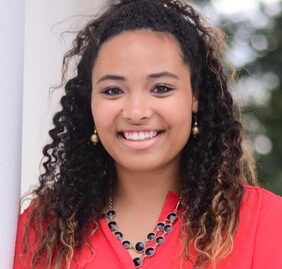by Rachel Olson, 2021 Undergraduate Summer Research Fellow in Lived Theology
In the last few weeks of research, my team and I have made meaningful strides uncovering hidden figures and events from the Civil Rights Movement in Virginia. Specifically, I learned a great deal about Danville as well as about eugenics at the University of Virginia. I wrote an article and gathered photos of public demonstrations held in Danville. In 1960, sixteen Black students attempted to use an all-white library that held books and facilities superior to the amenities at the Black library. Those students were removed from the white library, which closed promptly after the incident. Following this and several other incidents of racial injustice, the Danville Christian Progressive Association (DCPA) was formed. The DCPA led hundreds of united African Americans and allies to march to city hall, as well as to hold countless other demonstrations. Many African Americans were jailed as a result of these events, especially on the tragic “Bloody Monday,” during which white policemen committed violence against protestors. After months of protest, Danville citizens elected a Black mayor.
Eugenics, the study of manipulating reproduction in order to generate desirable traits, was a staple at the UVA hospital. James Lawrence Cabell, UVA professor of anatomy and surgery from 1837 to 1889, believed that “black persons were permanently handicapped by intellectual, emotional, and physical limitations.” He outlined his theory of race science in his book The Testimony of Modern Science in the Unity of Mankind. The University hospital, which opened in 1901, segregated Black patients to the basement in very poor, crowded conditions. Paul Brandon Barringer, UVA faculty chair from 1895 to 1903, saw African Americans as a major threat to public health and reinforced the argument that African Americans remain in separate sections of the hospital. UVA president Edwin Alderman and Barringer elected Harvey Earnest Jordan as a faculty member in 1907; Jordan would become dean of the medical school in 1939. He supported sterilization laws and discouraged interracial marriage. He also encouraged stopping treatment for African Americans if they were to become severely ill.
Thus far, I have had to slowly “digest” the new information I have discovered. I have learned a great deal about the stories of African Americans in Charlottesville and in Virginia. It was a battle for them each day to remain vigilant in fighting for equality. Uncovering more and more details causes me to reflect on how far Virginia has come. It is sad to reflect on the horrors of eugenics and police brutality, but I am grateful we are becoming a more integrated community that possesses a common respect for each other.
Read Rachel’s first blog post here.
Learn more about the 2021 Undergraduate Summer Research Fellowship in Lived Theology here.
The Project on Lived Theology at the University of Virginia is a research initiative, whose mission is to study the social consequences of theological ideas for the sake of a more just and compassionate world.

